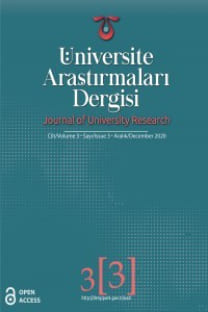Üniversite Öğrencilerinin Covid-19 Pandemi Sürecinde Uzaktan Eğitim Ortamlarının Kullanımına İlişkin Tutumlarının Belirlenmesi
COVID-19, uzaktan eğitim, tutum
Investigation of University Students’ Attitudes Towards Distance Education Processes in the Covid-19 Pandemic
COVID-19, distance education, attitudes,
___
- Aktaş, Y. (2020). MEB 23 Mart'tan itibaren uzaktan eğitime başlayacak. AA. Retrieved from: https://www.aa.com.tr/tr/egitim/meb-23-marttan-itibaren-uzaktan-egitime-baslayacak/1771386
- Aristovnik, A., Keržič, D., Ravšelj, D., Tomaževič, N., & Umek, L. (2020). Impacts of the COVID-19 pandemic on life of higher education students: A global perspective. Sustainability, 12(20), 8438.
- BBC News (2020, 03 13). Coronavirus: More universities halt teaching and exams. Retrieved from: https://www.bbc.com/news/education-51880355
- Bozkurt, A. (2020). Koronavirüs (Covid-19) pandemi süreci ve pandemi sonrası dünyada eğitime yönelik değerlendirmeler: Yeni normal ve yeni eğitim paradigması. Açıköğretim Uygulamaları ve Araştırmaları Dergisi, 6(3), 112-142.
- Cleland, J., Foster, K., & Moffat, M. (2005). Undergraduate students’ attitudes to communication skills learning differ depending on year of study and gender. Medical Teacher, 27(3), 246– 251. https://doi.org/10.1080/01421590400029541
- Elçiçek, M. (2021). Tendencies in Turkey-Based Academic Studies on Distance Education during the COVID-19 Pandemic. Journal of Educational Technology and Online Learning, 4(3), 406-417.
- Eygü H. & Karaman, S. (2013). Uzaktan Eğitim Öğrencilerinin Memnuniyet Algıları Üzerine Bir Araştırma. Kırıkkale Üniversitesi Sosyal Bilimler Dergisi, 3(1), 36-59.
- Gonçalves, S. P., Sousa, M. J., & Pereira, F. S. (2020). Distance learning perceptions from higher education students—The case of Portugal. Education Sciences, 10(12), 374. https://doi.org/10.3390/educsci10120374
- Greenhow, C. & Chapman, A. (2020). Social Distancing Meet Social Media: Digital Tools for Connecting Students, Teachers, and Citizens in an Emergency. Information and Learning Sciences, 121 (5/6), 341-352.
- Hebebci, M. T., Bertiz, Y., & Alan, S. (2020). Investigation of views of students and teachers on distance education practices during the coronavirus (COVID-19) pandemic. International Journal of Technology in Education and Science, 4(4), 267-282.
- Hodges, C., Moore, S., Lockee, B., Trust, T. ve Bond, A. (2020). The Difference Between Emergency Remote Teaching and Online Learning. Retrieved from:https://er.educause.edu/articles/2020/3/the-difference-between-emergency-remote-teaching-and-online-learning
- Karataş, B., & Zengin, S. (2021). Spor bilimleri fakültesi öğrencilerinin pandemi sürecinde uzaktan eğitim platformlarına ilişkin tutumlarının incelenmesi. Diyalektolog, (27).
- Kırali, F. N., & Alcı, B. (2016). Üniversite öğrencilerinin uzaktan eğitim algısına ilişkin görüşleri. İstanbul Aydın Üniversitesi Dergisi, 30, 55-83.
- Koç, E. S. (2021). Nasıl bir uzaktan eğitim? 1 yılın sonunda yapılan çalışmaların değerlendirilmesi. International Anatolia Academic Online Journal Social Sciences Journal, 7(2), 13-26.
- Kottasová, I. & Isaac, L. (2020, 03 04). Italy shuts all schools over coronavirus outbreak. Retrieved from: https://edition.cnn.com/2020/03/04/europe/italy-schools-closures-coronavirus-intl/index.html
- Lau, J., Yang, B. & Dasgupta, R. (2020). Will the coronavirus make online education go viral? Retrieved from: https://www.timeshighereducation.com/features/will-coronavirus-make-online-education-go-viral
- Macau University. (2018). A Quick Start Guide to Rain Classroom, a Next-Generation Digital Learning Environment. Retrieved from:https://ctle.um.edu.mo/2018/05/14/quick-start-guide-to-rain-classroom/
- Muflih, S., Abuhammad, S., Karasneh, R., Al-Azzam, S., Alzoubi, K. H., & Muflih, M. (2020). Online education for undergraduate health professional education during the COVID-19 Pandemic: Attitudes, barriers, and ethical issues. Research Square.
- MEB (2020, 03 12). Bakan Selçuk, Koronavirüse Karşı Eğitim Alanında Alınan Tedbirleri Açıkladı. Retrieved from: https://www.meb.gov.tr/bakan-selcuk-koronaviruse-karsi-egitim-alaninda-alinan-tedbirleri-acikladi/haber/20497/tr
- MEB (2020, 08 25). 18 Eylül'e Kadar Sürecek Uzaktan Eğitim Döneminin Yol Haritası. Retrieved from:http://www.meb.gov.tr/18-eylule-kadar-surecek-uzaktan-egitim-donemininyol-haritasi/haber/21499/tr
- Stevanović, A., Božić, R., & Radović, S. (2021). Higher education students' experiences and opinion about distance learning during the Covid‐19 pandemic. Journal of Computer Assisted Learning, 37(6), 1682-1693.
- Pfleger, P. (2020). The Challenges Of Online-Only Classes During Coronavirus Outbreak. Retrieved from:https://www.npr.org/2020/03/12/814824067/the-challenges-of-online-only-classes-during-coronavirus-outbreak
- Sheehey, M. (2020). UNC offers a pass/fail option for students, suspends spring 2020 Dean's List. Retrieved from:https://www.dailytarheel.com/article/2020/03/pass-fail-suspended-deans-list-cv-grade-not-incomplete-coronavirus-0320
- Sözen, N. (2020). Covid 19 sürecinde uzaktan eğitim uygulamaları üzerine bir inceleme. Avrasya Sosyal ve Ekonomi Araştırmaları Dergisi, 7(12), 302-319.
- Telli, S. G. ve Altun, D. (2020). Coronavirüs ve çevrimiçi (online) eğitimin önlenemeyen yükselişi. Üniversite Araştırmaları Dergisi, 3(1), 25-34. https://doi.org/10.32329/uad.711110
- Togoh, I. (2020). Coronavirus Latest: Italy Shuts All Schools and Universities As Covid-19 Cases Rise. Retrieved from: https://www.forbes.com/sites/isabeltogoh/2020/03/04/coronavirus-latest-italy-shuts-all-schools-and-universities-as-covid-19-cases-rise/?sh=6bd56f573c56
- Toquero, C. M. (2021). Emergency Remote Education Experiment Amid COVID-19 Pandemic in Learning Institutions in the Philippines. International Journal of Educational Research and Innovation, 15, 162-176.
- TRT Haber (2021). İngiltere'de uzaktan eğitim dersleri BBC'den yayınlanacak. Retrieved from:https://www.trthaber.com/haber/dunya/ingilterede-uzaktan-egitim-dersleri-bbcden-yayinlanacak-544387.html
- Uyar, S. (2021). Pandemi sürecinde milyonlarca öğrenci eğitimden yoksun kaldı. Cumhuriyet. Retrieved from:https://www.cumhuriyet.com.tr/haber/pandemi-surecinde-milyonlarca-ogrenci-egitimden-yoksun-kaldi-1836313
- Uzun, G. Ö., EŞ, A. Ç., & Evram, G. (2020). Examination of attitudes of university students in distance education according to some variables. Near East University Online Journal of Education, 3(2), 104-115.
- Yaman, B. (2021). Covid-19 pandemisi sürecinde Türkiye ve Çin’de uzaktan eğitim süreç ve uygulamalarının incelenmesi. OPUS Uluslararası Toplum Araştırmaları Dergisi, Cilt 17, Pandemi Özel Sayısı, 3298-3308.
- Yekefallah, L., Namdar, P., Panahi, R., & Dehghankar, L. (2021). E-öğrenmenin boyutlarına göre Covid-19 pandemisi süresince öğrencilerin e-öğrenme uygulamasına ilişkin memnuniyetlerine ilişkin faktörler. Helyon , 7 (7), e07628.
- Yıldız, E. P., Çengel, M. ve Alkan, A. (2021). Pandemi sürecinde uzaktan eğitim ortamlarının kullanımına ilişkin tutum ölçeği. OPUS Uluslararası Toplum Araştırmaları Dergisi, 17(33), 132-153. https://doi.org/10.26466/opus.811510
- YÖK (2020). Basın açıklaması. Retrieved from:https://covid19.yok.gov.tr/Documents/alinan-kararlar/03-uzaktan-egitime-iliskin-alinan-karar.pdf
- Başlangıç: 2018
- Yayıncı: Durmuş GÜNAY
Mustafa ASLANDEREN, Hatice ÇİLSALAR SAGNAK
Halil İbrahim ÖZMEN, İlker Hüseyin ÇARIKÇI, Murat Ali DULUPÇU
Türkiye’de Makine Mühendisliği Eğitimi Veren Üniversitelerin Mevcut Durumunun Araştırılması
Meslek Yüksekokulu Öğrencilerinin Temel Gıda Analizlerini Anlama Düzeylerinin Belirlenmesi
Nilay KORKMAZ, Zeynep NALE, Ramazan Ülkü ÇETİN, Merve Begüm NARLI
Akademik Güdülenme İle Üniversiteye Aidiyet Duygusu Arasındaki İlişki
Türkiye'de Deprem Sonrası Çevrimiçi Öğrenmenin Vazgeçilmezliği
Sahure Gonca TELLİ, Deniz ALTUN
Akademisyenlerin Kariyer Kimliğinin İnşası: Seçkin Akademisyenler Üzerine Bir Çoklu Vaka Çalışması
Hatice Merve BİRCAN ALTINSOY, Nihat ERDOĞMUŞ
Gümrük İşletme Bölümüne Yönelik Öğrenci Algıları: Fenomenolojik Bir Araştırma
Matematiğin ve Varlığın Sınırlarına Hârizmî Cebri Üzerinden Yeniden Bakmak
